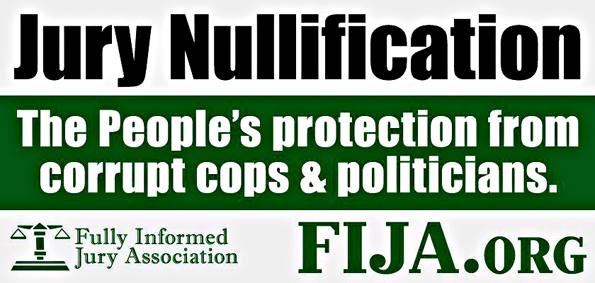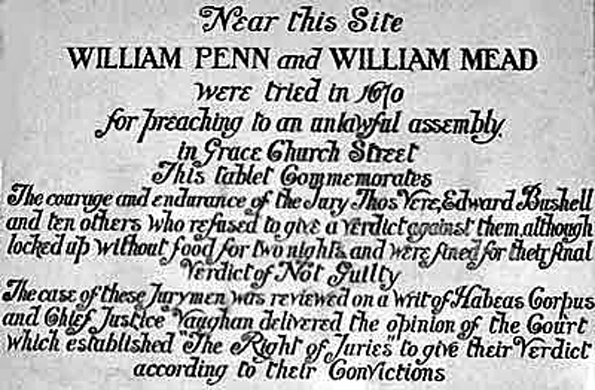|
|
| Plaque at the Old Bailey, London. |
|
|
|
|
One of the ancient and primary duties of the juror in a free state is to judge the law.
The number of 12 jurors was established so that there would be enough to represent a cross section of people.
The hung or deadlocked jury was designed as a part of this role of judging the law, as well as the facts.
The role of the hung jury is to protect the minority of people from the dangers of majority rule.
The example given is that Democracy is 11 wolves and one sheep voting on a law for what to have for dinner.
With the jury, and its requirement of unanimity, one sheep can hang the jury and stop the law from being enforced.
This is why Jefferson said the right to serve on a jury is more important than the right to vote, since no matter what laws are passed only a jury can enforce them.
Simply put, if a juror thinks a law is bad, a single juror can hang the jury and prevent enforcement of bad laws on a case by case basis. If this happens enough, government cannot enforce laws that do not have consensus with the whole of the people.
All the founding fathers believed the jury is the safeguard of freedom to protect people from overreaching government.
Don't be afraid. The government, not even the judge, can punish you for voting your conscience, even if you vote to acquit a man who is guilty of breaking a bad law.
Judges rarely inform juries of their nullification power. The power of jury nullification derives from an inherent quality of common law s—a general unwillingness to inquire into jurors' motivations during or after deliberations. A jury's ability to nullify the law is further supported by two common law precedents: the prohibition on punishing jury members for their verdict, and the prohibition on retrying defendants after an acquittal.
Here is one of the shining examples of history when the jury did such a thing and gave people essential freedom government would otherwise not allow.
Quakers William Penn and William Mead were arrested in England in August 1670 for violating the Conventicle Act, which forbade religious assemblies of more than five people outside the auspices of the Church of England.
The jury found the two "guilty of speaking in Gracechurch Street" but refused to add "to an unlawful assembly".
The infuriated judge, Sir Samuel Starling, charged the jury that they "shall not be dismissed until we have a verdict that the court will accept".
Penn and Mead were clearly guilty of breaking the law.
But the jury went back and defiantly modified the verdict to "guilty of speaking to an assembly in Gracechurch Street", whereupon the judge had them locked up overnight without food, water or heat.
Penn protested and the judge ordered him bound and gagged.
Finally, after a two-day fast, the jury defiantly returned a not guilty verdict.
The judge fined the jury for returning a verdict contrary to their own findings of fact. He told them they could not judge the law
Penn protested that this violated the laws of Magna Carta which since ancient times held that the truest duty of the juror is to forbid government punishing people without the jury's consent.
Penn was forcibly removed from the court.
The judge found the jury in contempt of court and removed them to prison.
Edward Bushel, a member of the jury, refused to pay the fine.
Bushel petitioned the Court of Common Pleas for a writ of habeas corpus. Sir John Vaughan, Chief Justice of the Court of Common Pleas, ruled that a jury could not be punished simply on account of the verdict it returned.
Bushell was released after eight months in prison.
The decision that a judge cannot punish a jury, or a juror for its verdict, reaffirmed jury nullification, and, in so doing, the jury in turn gave to England freedom of religion and freedom of peaceable assembly, neither of which the government granted to its people.
While a jury verdict contrary to the letter of the law pertains only to the particular case before it, it set the precedent and freedom of religion was allowed in England later to be transplanted to the USA.
While government might have wished to dictate religion and assembly as they do in countries today that don't have jury nullification, England knew that juries would not approve the repression of freedom.
They knew that if they tried to enforce a mandatory state religion a pattern of acquittals by juries would develop, making it impossible to prosecute a statutory offence.
It has the de facto effect of invalidating the statute.
The jury still has this power, although most jurors are stupidly unaware of this fact.

|


